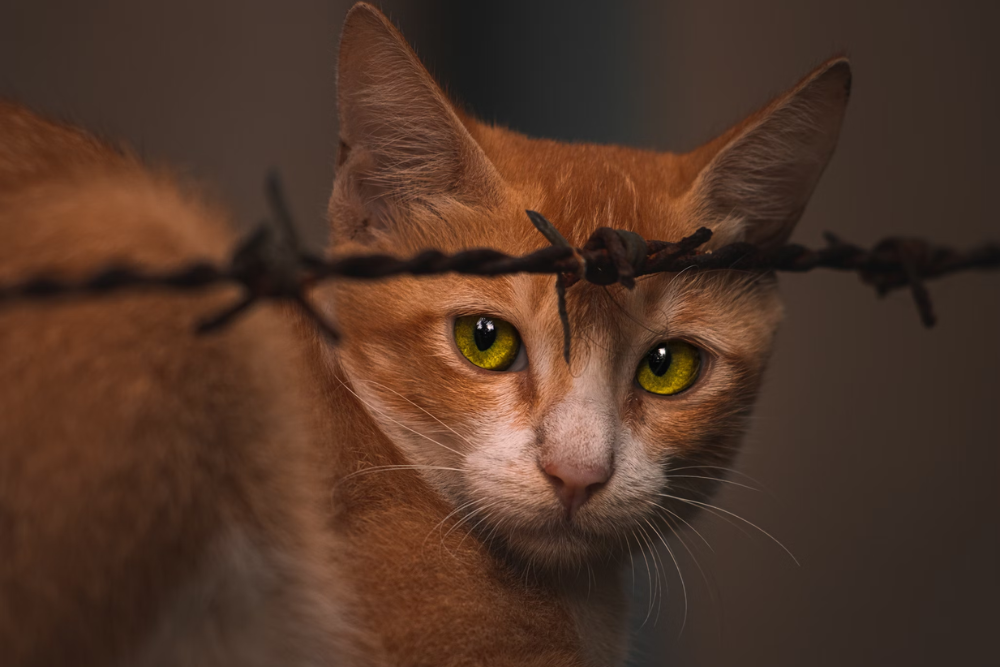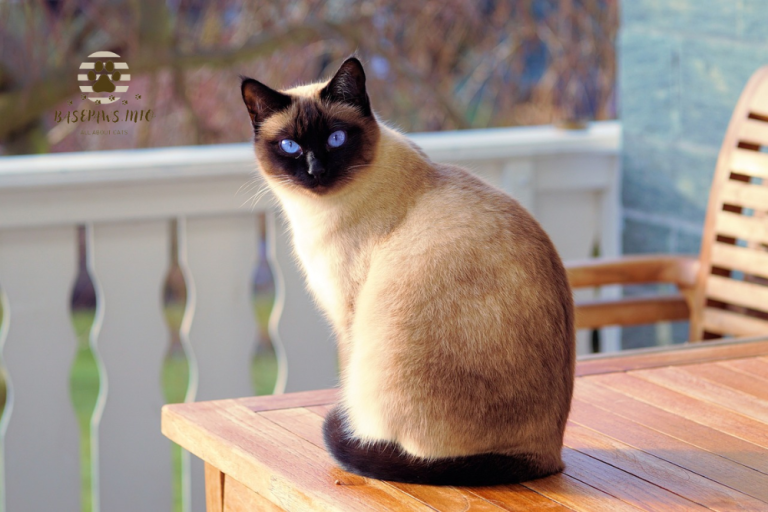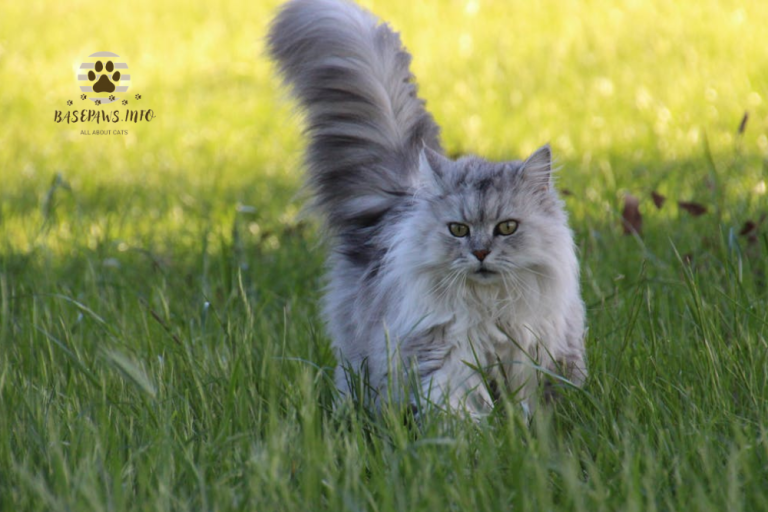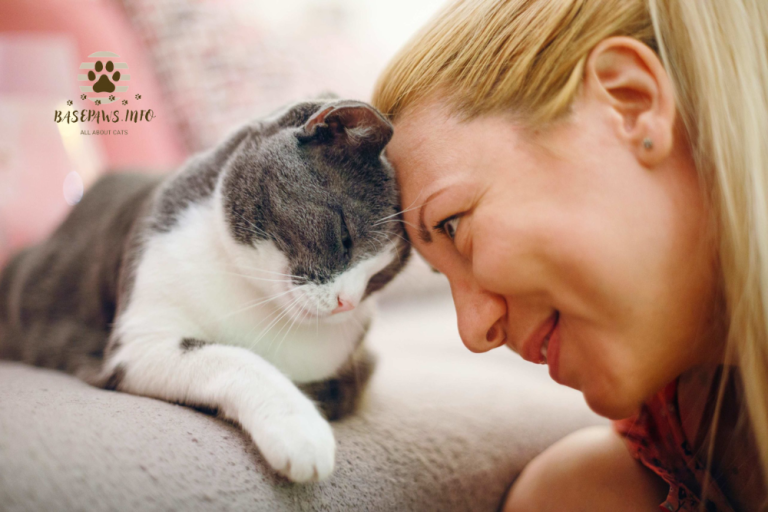Why Is My Cat Meowing at Night? Causes and Solutions Explained
Is your cat keeping you awake with constant meowing at night? Many cat owners face this frustrating issue, but rest assured—there are solutions. Cats may meow for a variety of reasons, including hunger, boredom, or health concerns. Understanding the root cause of your cat’s vocalization is essential for finding the right solution.
By adjusting your cat’s routine and environment, you can significantly reduce nighttime meowing and enjoy a peaceful night’s sleep again. Let’s explore the causes and solutions for cat meowing at night in more detail.
Why Do Cats Meow at Night?
Cat Myth vs. Cat Fact: Is My Cat Nocturnal or Crepuscular?
A common belief is that cats are nocturnal, meaning they are most active at night. However, this is actually a myth. Cats are crepuscular, which means they are most active at dawn and dusk. Your cat may be meowing at night because its natural body clock is telling it to hunt or explore during these twilight hours.
If your cat meows during the night, understanding this crepuscular behavior can help you manage its routine better, ensuring you both get rest when you need it.
Common Reasons for Cat Meowing at Night
There are various reasons why your cat may be meowing at night. Some of the most common causes include:
- Internal Hunting Time Clock: Cats are instinctively driven to hunt during dawn and dusk.
- Routine Changes: A sudden shift in your daily routine, such as feeding or playtime schedules, can confuse your cat.
- Stress and Anxiety: Cats are sensitive to environmental changes or disruptions in their home, which can lead to anxiety and increased vocalization.
- Medical Issues: Health problems, such as thyroid disease or kidney issues, can make cats more vocal, especially at night.

Top Reasons for Nighttime Cat Meowing
Cats Are Naturally More Active at Night
Cats tend to be more awake and alert during the night and early morning hours. This is due to their natural predatory instincts. If your cat doesn’t get enough exercise during the day, it may have excess energy at night, leading to meowing.
Boredom: Why Your Cat Meows at Night for Attention
A bored cat will often seek attention by meowing at night. Cats need mental and physical stimulation throughout the day to prevent them from becoming restless when you’re trying to sleep. If your cat meows persistently at night, it may be trying to get your attention for playtime or companionship.
Medical Causes: Thyroid or Kidney Disease
Hyperthyroidism and kidney disease are two common medical conditions that can cause increased vocalization in cats, especially at night. If your cat’s nighttime meowing is accompanied by other symptoms, such as weight loss, increased thirst, or changes in appetite, it’s essential to consult a veterinarian.
Aging Symptoms: Why Senior Cats Meow at Night
As cats age, they may experience cognitive dysfunction, similar to dementia in humans. This can cause confusion, disorientation, and increased vocalization at night. Senior cats may also meow due to vision problems or hearing loss, which can make them feel more vulnerable during the dark, quiet hours.
Outdoor Cats Feeling Trapped Indoors
If your cat is used to spending time outdoors, being confined indoors at night can lead to feelings of frustration or restlessness. This might result in meowing as your cat attempts to express its desire to go outside.
Cat Yowling at Night: Could It Be Mating?
Unneutered cats are more likely to meow or yowl at night as a mating call. If your cat is not spayed or neutered, this could be a major reason for its nighttime vocalization. Spaying or neutering your cat can greatly reduce this behavior and also provide health benefits.
How to Address Cat Meowing at Night
Recognizing Attention-Seeking Meows
Sometimes, your cat may meow at night purely to get your attention. If you respond by giving it food, cuddles, or playtime, you may accidentally be reinforcing the behavior. It’s important to recognize attention-seeking meows and not reward them if you want to break the cycle.
Positive Reinforcement vs. Accidentally Reinforcing Nighttime Meowing
If you respond to every meow with attention, you’re teaching your cat that meowing gets a reward. Instead, focus on positive reinforcement during the day. Reward your cat when it’s quiet and well-behaved, and ignore meows that are purely for attention at night.
Should You Ignore Your Cat Meowing at Night?
While it’s tempting to respond to your cat’s meows at night, ignoring them may be the best approach if your cat is healthy and has all its needs met. Just ensure that your cat has access to food, water, and a clean litterbox before you go to bed.
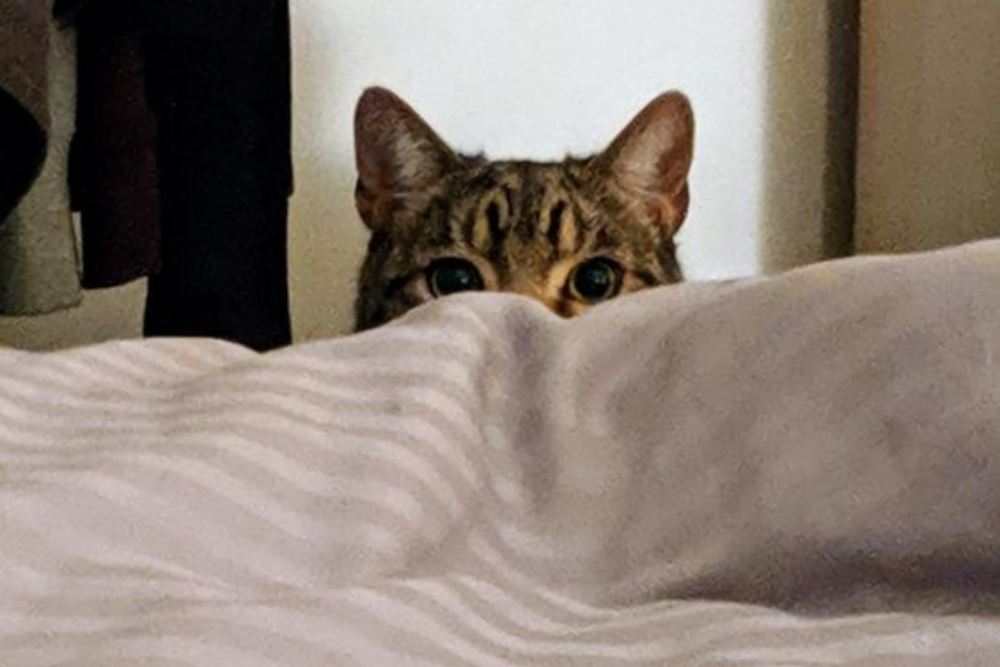
Effective Ways to Stop Cat Meowing
Resetting Your Cat’s Internal Body Clock
To help your cat adjust to a schedule that works for both of you, keep it active during the day and evening. You can do this by engaging your cat in play sessions in the afternoon and providing mental stimulation through interactive toys. By resetting your cat’s internal body clock, you can encourage it to sleep during the night.
Providing the Essentials: Food, Water, and a Clean Litterbox
Before going to bed, ensure your cat has everything it needs for the night:
- Fresh food
- Water
- A clean litterbox
By addressing these basic needs, you can reduce nighttime meowing related to hunger or discomfort.
Managing Hunger with Proper Feeding Schedules
Feeding your cat at a consistent time every day can help prevent hunger-driven meowing at night. Consider feeding your cat a meal shortly before bedtime to keep it satisfied throughout the night.
Creating a Cozy, Comfortable Sleeping Environment
Providing a cozy sleeping space for your cat can also help reduce nighttime vocalization. A warm bed in a quiet corner of your home can encourage your cat to rest rather than meow for attention.
Engaging Your Cat to Reduce Nighttime Meowing
Play With Your Cat Before Bed to Prevent Nighttime Meowing
A tired cat is a quiet cat! Play with your cat before bed to expend some of its energy and reduce the chances of nighttime meowing. Use interactive toys to engage your cat and simulate hunting behaviors, which will naturally tire it out.
Toys and Activities for Mental and Physical Stimulation
Here are some great toys and activities to keep your cat entertained and stimulated:
- Puzzle feeders to challenge your cat mentally
- Feather wands for active play sessions
- Laser pointers to get your cat moving
- Catnip toys to spark curiosity and playfulness
Helping Senior Cats with Nighttime Meowing
Vision and Cognitive Issues: Why Older Cats Meow at Night
Senior cats may suffer from cognitive dysfunction, which leads to confusion, anxiety, and increased vocalization at night. If your older cat is meowing more frequently, consult your veterinarian for advice on managing these cognitive issues.
Using Nightlights to Comfort Senior Cats at Night
Installing nightlights around your home can help senior cats navigate during the dark, reducing their anxiety and need to vocalize. This simple solution can offer comfort to older cats with vision problems.
Dealing with Separation Anxiety and Emotional Needs
How Emotional Changes Trigger Cat Meowing at Night
Cats can be sensitive to changes in their environment, such as moving homes or the introduction of new pets. These emotional changes can trigger separation anxiety, which might lead to nighttime meowing. Address your cat’s emotional needs with extra attention and routine stability.
Handling Environmental Changes That Affect Your Cat’s Behavior
Cats are creatures of habit. Changes like new furniture, renovations, or new household members can cause stress, resulting in nighttime meowing. Providing a safe, familiar space for your cat can help them adjust more easily.
When to Consult a Veterinarian or Cat Behaviorist
Recognizing When Nighttime Meowing Requires Expert Help
If your cat’s nighttime meowing persists despite trying these solutions, it may be time to consult a veterinarian or a cat behaviorist. There could be underlying medical issues that need treatment, or behavioral patterns that need professional guidance.
Medical Treatments for Excessive Nighttime Meowing
In some cases, medications or other treatments may be necessary to manage medical issues such as hyperthyroidism, kidney disease, or cognitive dysfunction. Consult your veterinarian to explore the best treatment options.
Additional Resources for Understanding Cat Behavior
If your cat’s nighttime meowing persists despite trying the above strategies, there are additional resources to explore. These options can deepen your understanding of feline behavior and offer solutions tailored to your cat’s needs.
Feline Behavior Classes
Enrolling in a feline behavior class can offer structured insights into why your cat may be meowing at night. Certified behaviorists cover essential topics like interpreting body language, reducing anxiety, and using positive reinforcement. You can find these classes online or through local veterinarians and animal shelters.
Meowing in Sleep: Is It Normal?
Cats, like humans, dream during their REM sleep cycle, and meowing during sleep often indicates they’re dreaming. This behavior is generally harmless, but if your cat shows signs of restlessness or distress, it could be anxiety or pain. In such cases, consulting a vet is wise.
Senior Cats and Nighttime Meowing
As cats age, they may become more vocal at night. This could be due to cognitive dysfunction syndrome (CDS) or vision and hearing loss, which can make them anxious. Simple solutions include:
- Keeping a nightlight on for navigation
- Offering a cozy, quiet space for rest
- Consulting a vet about cognitive health supplements
Ignoring Cat Meowing at Night: When Is It OK?
In some cases, ignoring nighttime meowing is the best approach, especially if it’s driven by boredom or attention-seeking. However, if meowing is paired with symptoms of discomfort, increased thirst, or changes in appetite, don’t ignore it. A veterinary visit may be needed to rule out underlying health issues.
Resetting Your Cat’s Sleep Schedule
Below is a concise and easy-to-read table for the section Resetting Your Cat’s Sleep Schedule:
| Action | Description |
|---|---|
| Increase Daytime Activity | Engage your cat with interactive play sessions during the day, especially in the afternoon and evening, to tire them out before nighttime. |
| Provide Enrichment | Use puzzle toys or food-dispensing toys to stimulate your cat mentally and physically, keeping them occupied during the day. |
| Adjust Feeding Times | Feed your cat the largest meal of the day right before bedtime to promote restful sleep with a full stomach. |
| Create a Cozy Sleeping Environment | Ensure your cat has a quiet, comfortable space to sleep, encouraging them to rest through the night. |
| Playtime Before Bed | Spend time playing with your cat before bed to help burn off any excess energy, making them more likely to sleep through the night. |
Toys to Keep Cats Engaged
Interactive play is key to managing nighttime vocalization. Some useful toys include:
- Puzzle Toys: Mentally and physically stimulating.
- Wand Toys: Mimic hunting behavior and burn energy.
- Laser Pointers: Quick and effective way to keep your cat active.
- Catnip Toys: Promote excitement and tire your cat out before bed.
When to Consult a Veterinarian or Behaviorist
If the meowing continues despite your best efforts, seek professional advice. A veterinarian can rule out medical issues like hyperthyroidism or kidney disease, while a behaviorist can offer personalized solutions for managing your cat’s behavior.

